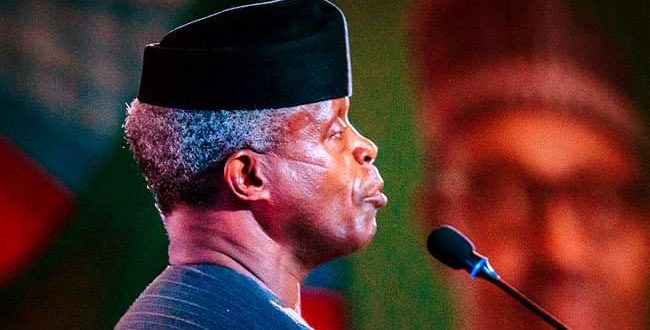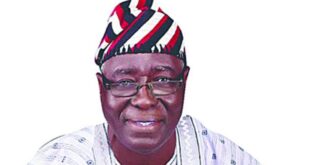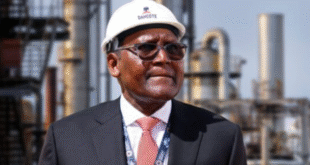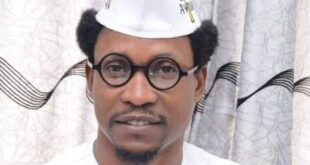…VP Commends Zulum’s incredible achievements, lists COVID – 19 response, Security, Climate Change, Education, 4th Industrial Revolution, & AfCFTA, as priority areas
…Says all tiers of government must be open-minded, collaborative
MAIDUGURI – Vice President Yemi Osinbajo, SAN, has said that despite the current turbulent socio-economic conditions in the country and the tough challenges they pose, generating economic growth, eradicating poverty, developing human capital and building up Nigeria’s infrastructural backbone in a sustainable manner is certainly doable, especially with a sense of urgency.
According to a release e-signed and made available to StarTrend Int’l & online – www.startrendinternational.com by Laolu Akande, Senior Special Assistant to the President on Media & Publicity, Office of the Vice President, Osinbajo stated further, “In that effort therefore, all the tiers of government and critical partners ought to be focused, open-minded and collaborative in meeting shared aspirations, providing better and fuller lives, and decent jobs for Nigerians, especially the youths.”
Prof Osinbajo expressed these views while virtually declaring open, the 20th meeting of the Joint Planning Board and the National Council on Development Planning holding on Thursday, August 5, 2021 in Maiduguri, Borno State. Members of the Board and Council are drawn from the Federal Government and Economic Planning Commissioners from State Governments.
The Vice President who spoke mainly on the COVID – 19 Pandemic, Security, Climate Change, Education, the Fourth Industrial Revolution, and the African Continental Free Trade Agreement, noted that these issues require deliberate policy responses and deserve the attention of economic managers.
Speaking on the government’s response to the pandemic, the VP said “the COVID-19 pandemic has had a unique and devastating impact on our health, economic systems, and social life. For a vibrant and enterprising people like ours, the whole experience of lockdowns and social distancing has been quite trying while economic difficulties made existing socio-economic conditions even harder.
“The Federal Government responded by way of the Economic Sustainability Plan which focused on saving and creating businesses and jobs while boosting local production. Thus we had the very impactful MSME Survival Fund, the Agriculture for Food and Jobs, Mass Housing, the Rapid Response Register, and the SolarPowerNaija Programmes amongst other things.
“It can be said that the ESP worked in the sense that the economy recovered quite early from the recession occasioned by the pandemic, but it must also be said that we are not yet out of the woods.”
COVID-19
Continuing, he said “some people have described the current wave as a pandemic of the un-vaccinated in the sense that it is people who have not been vaccinated in developed economies that are most seriously affected.
“As economic managers, we are faced with two related challenges that might hinder our return fully to economic activity.”
“First we must find the resources to procure and administer sufficient quantities of COVID-19 vaccines and actively encourage our people to get vaccinated to enable us as a country to reach herd immunity. Secondly, we must ponder on ways and means of restoring and boosting local capacity to produce vaccinations, not only for COVID-19 but for the other diseases that continue to stalk the land.”
CLIMATE CHANGE
On climate change, Prof. Osinbajo restated his earlier calls for a just transition to net-zero emission, noting that Africa has contributed least to global warming but is expected to suffer the most from its consequences.
According to him, “global efforts to tackle climate change and ensure environmental sustainability will challenge us here in Nigeria in a number of ways. Quite evidently, the global drive to reduce the use of fossil fuels to mitigate the rise in global temperature will reduce demand for fossil fuels. This will affect us because of our dependence on oil and gas for revenues and foreign exchange earnings. We just have to find alternative sources.
JUST TRANSITION
“At the same time, we have limited resources with which to finance the technological and lifestyle changes needed to adapt to climate change. This means that the push by multilateral finance institutions to defund oil and gas projects will be particularly hurtful.
“This is why I continue to join other well-meaning leaders across the world to call for a just transition and a standstill of attempts to defund gas projects at the forthcoming 26th Conference of Parties of the United Nations Climate Change Conference in Glasgow.”
SECURITY
On security, the VP said the Federal Government has over the past few years invested huge resources in equipment and human resources, noting that the emphasis for stakeholders including economic planners, “must be on effective synergies with the Federal Government.”
HUMAN CAPITAL DEVELOPMENT
Emphasizing the focus on human capital development, Prof. Osinbajo expressed the view that with adept planning, Nigeria can leapfrog into the digital age.
He explained: “there are those who wonder how a country like Nigeria will cope with the 4th Industrial Revolution given that we have struggled to catch up with the 2nd and 3rd Industrial Revolutions. But the answer is simple: education, education, education, especially basic education. It is scandalous for us to be dealing with out-of-school children.
“We must put resources into education; today we have no choice but to focus on relevant education. Education that will prepare our young people for 21st-century jobs and opportunities.
“At the same time, we must find the resources to invest in technology and related broadband infrastructure if we are to help the budding technology ecosystem in our country to continue to excel.”
$500M INNOVATION FUND
“This is why the Federal Government is working assiduously with the African Development Bank to launch the Nigerian Innovation Programme which will be backed by a $500 million fund to support the technology and creative sectors of the economy,” he added.
AfCFTA
On the African Continental Free Trade Area, the VP said “it is another development with great promise for Nigeria’s economic prospects but one for which we have to be well prepared.
“First, we must especially, as sub-nationals, take a more active interest in the agreement, its implications and opportunities for our States. The businesses and enterprises that will benefit or be at disadvantage on account of the free trade agreement are in our States. And we owe them and our governments a duty to look out for their interests.”
Prof Osinbajo also commended the Borno State Governor, Prof Babagana Zulum, acknowledging “the great strides that he has been making.”
The VP observed that “looking at the work he has done in housing, education, small businesses, with little resources and in one of the worst-hit States in terms of terrorist disruptions, it is evident that our problem is often not the paucity of funds, but a paucity of dedication to the people and their wellbeing. Your Excellency, we are proud of the incredible achievements you have made in barely three years.”
Earlier in his remarks, Governor Zulum said the hosting of the annual meeting of economic planners across the country affords the State the opportunity to showcase its efforts across different sectors aimed at improving the lives of the people.
He said the reforms the State government introduced are rejuvenating the State’s economy despite the challenges posed by the insurgency and the COVID-19 pandemic and acknowledged the support of the Federal Government in the implementation of the measures.
On her part, the Minister of Finance, Mrs (Dr) Zainab Shamsuna Ahmed said the challenging times confronting the global and local economies required constant interactions among policymakers and synergy of ideas and resources with a view to finding possible solutions.
In a goodwill message, the United Nations Humanitarian Coordinator in Nigeria, Mr Edward Kallon while commending the efforts of the Federal and State governments, said addressing the security challenge in Borno State and the entire Northeast will be critical to economic stability and general wellbeing of the people of the entire Lake Chad region.
Other officials present at the event include the Deputy Governor of Borno State, Alhaji Umar Kadafur; Minister of State for Budget and National Planning, Prince Clem Agba; Commissioners of Budget & Economic Planning across the Federation, and representatives of development partners, among others.
 Startrend International Magazine For Your Latest News And Entertainment Gists
Startrend International Magazine For Your Latest News And Entertainment Gists





